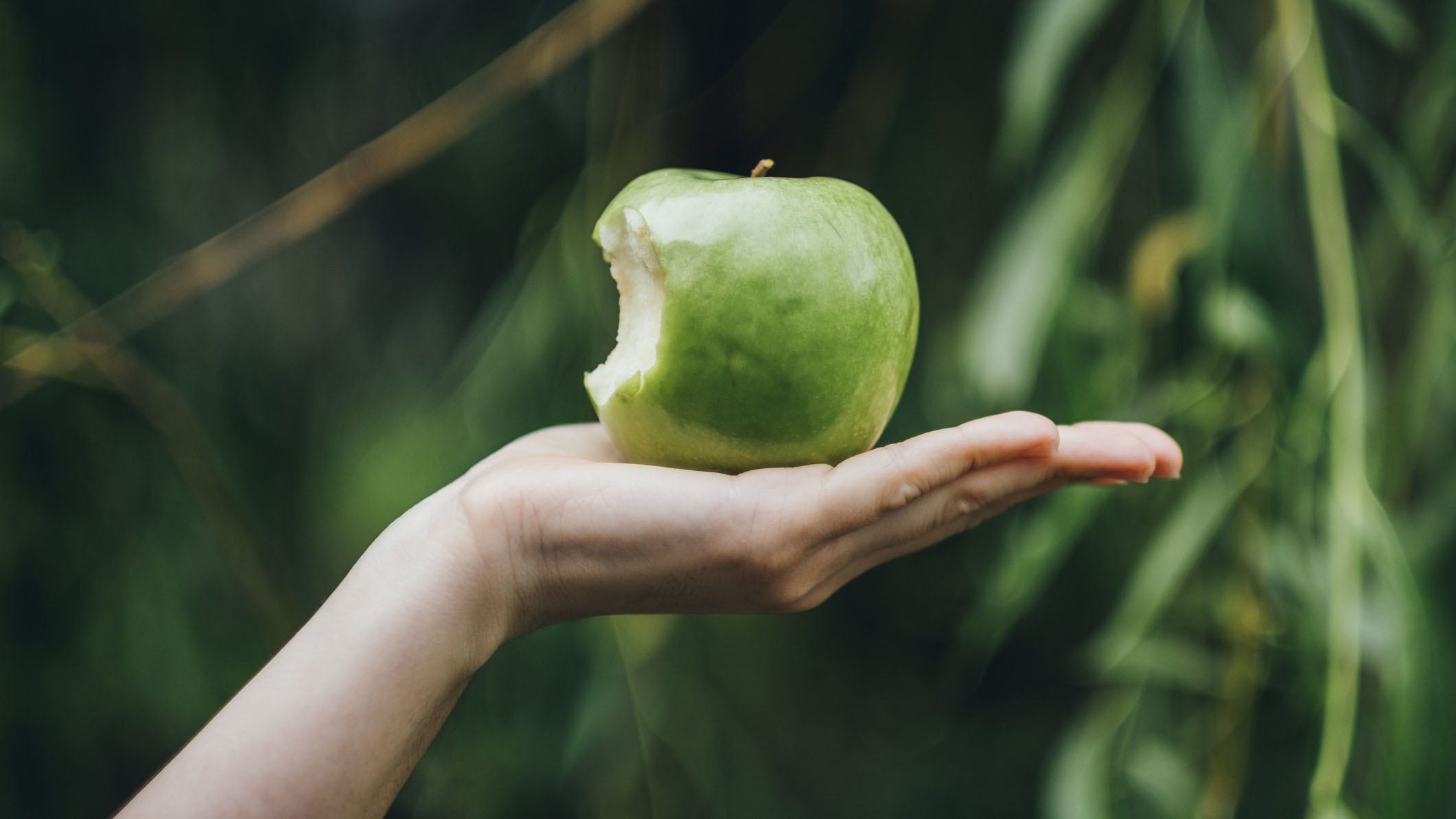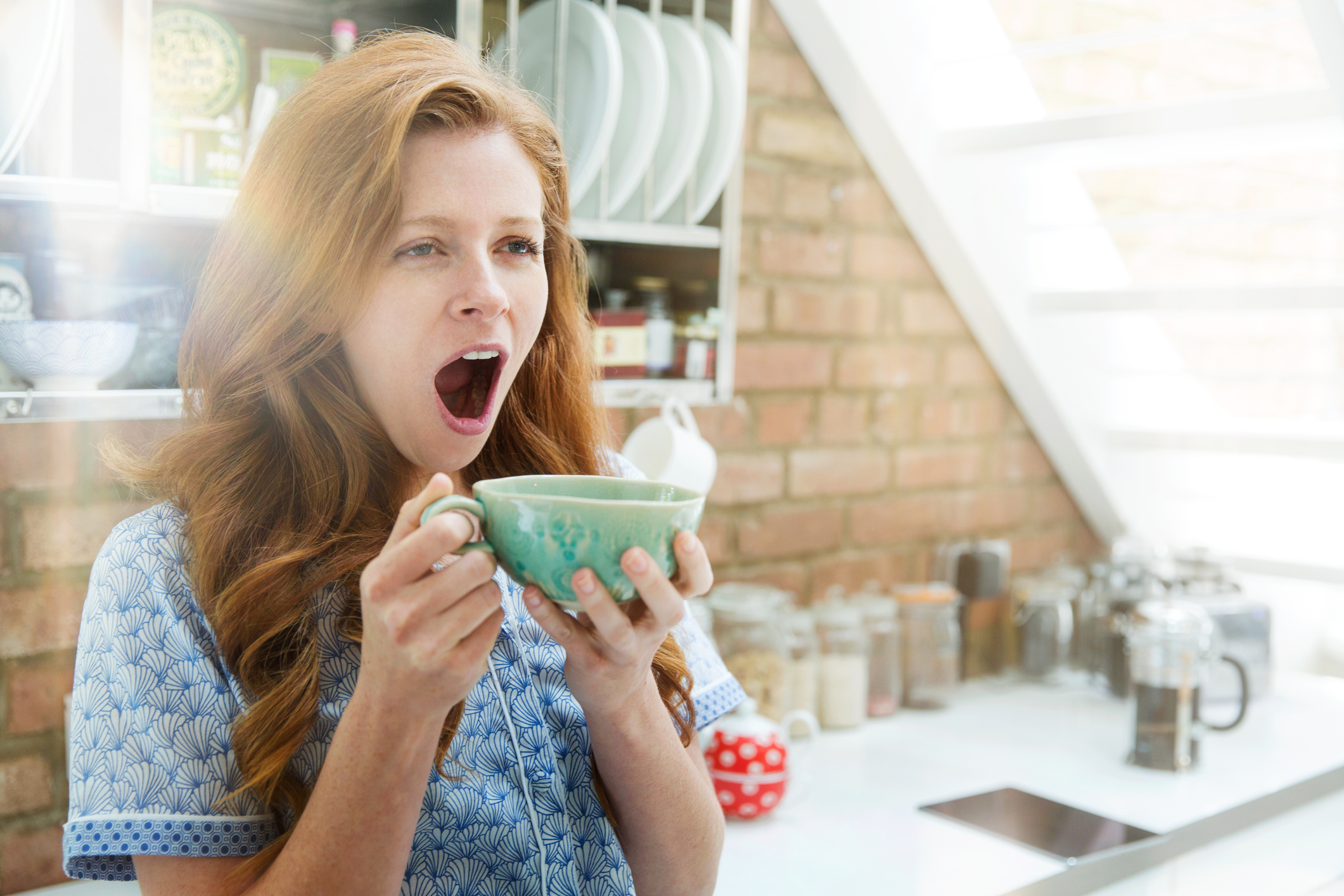Can an apple really wake you up faster than a cup of coffee? A nutritionist responds
How much caffeine do apples have and can they wake you up as much as coffee can? We find out

You haven’t had the best night’s sleep and are feeling really tired, so you reach for… an apple? While most of us turn to a nice hot cup of coffee when we need help waking up, an apple is often touted as being more energizing than our favorite caffeinated drink. But is that really true? Can an apple really wake you up faster than a cup of coffee?
“Probably not, no,” says Rob Hobson, a UK-based nutritionist and author. “What you get from coffee is that it stimulates the central nervous system and that's what you need to fight fatigue and increase your energy levels.”
However, that’s not to say that an apple doesn’t also have energy-boosting qualities — just in a different way. “While an apple contains no caffeine, its sugar content and fiber can provide the right fuel to give you a slow release of energy without experiencing a sugar crash,” explains Karine Patel, a UK-based nutritionist.
Let’s take a closer look at which can wake you up faster, an apple or a cup of coffee.
Apple vs coffee — which wakes you up faster?
Apples are an excellent source of slow release energy, thanks to their fiber, fructose and carbohydrate content. However, a cup of coffee is more effective than an apple at providing an immediate mental boost.
“We know that coffee has an effect on reducing fatigue and stimulating your nervous system,” says Hobson, who explains that this is because caffeine blocks a neurotransmitter within the body called adenosine, which is a chemical which helps us feel sleepy. “Coffee blocks adenosine and it increases levels of other neurotransmitters in your brain, like dopamine, that regulate your energy levels,” says Hobson.

Contrary to popular belief, coffee doesn’t actually provide you with energy as (consumed alone) alone doesn’t contain any calories. “What it’s doing is making you more mentally alert,” explains Hobson.
Sign up to get the BEST of Tom's Guide direct to your inbox.
Get instant access to breaking news, the hottest reviews, great deals and helpful tips.
“An apple is an energy source as it’s giving you some calories in the form of sugar, fruit sugar and carbohydrates. But I think most people would agree that if they wake up and it’s eat an apple or have a cup of coffee? I know which one is going to make me feel slightly more alert.”
Is coffee good for sleep?
Coffee and quality sleep don’t often go hand in hand (aside from when taking a coffee nap). “Coffee contains caffeine, a stimulant that helps reduce tiredness,” explains Patel. For that reason, consuming coffee too close to bedtime can make it difficult to fall asleep.
Caffeine has a half-life of five to 9.5 hours, which means that — depending on your sensitivity to it — half of the caffeine you have consumed will still be kicking around your bloodstream after that length of time, which can make it difficult for you to fall asleep.
However, if consumed in moderation, there are certain health benefits to drinking good quality coffee. A 2023 study suggests that drinking coffee can help reduce your risk of dementia and Alzeimer’s disease, while a separate study from last year showed that drinking coffee helped curb the risk of developing type 2 diabetes.
If drinking coffee is part of your daily routine, maximize its health and brain-stimulating benefits and minimizing any negative effects on your sleep by following the five following guidelines:
How to drink coffee without affecting your sleep
1. Have a clear cut off time
Don’t drink coffee (or any caffeinated drink) within a minimum of eight hours of going to bed. Drinking coffee too close to bedtime will make it harder to fall asleep, as caffeine blocks the neurotransmitter adenosine, which tells us when we’re tired.

2. Don't add sugar
Avoid adding sugar or syrup or other unhealthy ingredients to your daily cup of Jo, advises Hobson. “Stick to coffee that's just got a little bit of milk or black or cold drip or whatever you fancy,” he says.
3. Consume your coffee within moderation
Unlike an apple, consuming too much coffee can cause unpleasant side effects, like feeling jittery and anxious. You might also get a headache, and feel your energy levels suddenly crash.
4. Don’t drink coffee as soon as you wake up
As tempting as a hot cup of coffee can be as soon as you wake up, Patel advises you wait an hour and a half before drinking caffeine in the morning. “As coffee can interfere with cortisol and adenosine levels in the morning, it is highly recommended to wait 90 minutes after waking up to have a first cup of coffee,” explains Patel. “This is to avoid having a crash two hours after having a coffee in the morning.”
5. Combine your coffee with an apple for maximum energy
Just because coffee helps wake you up faster than eating an apple, that doesn’t mean that there isn’t room for both in your morning routine. Patel recommends starting your day with an apple (alone or as part of a breakfast smoothie), before moving on to a cup of coffee. "To get the most energising benefits from an apple and a coffee, the best way would be to start your day with an apple, and to drink coffee 90 minutes after waking up.," says Patel.

Nicola is the Sleep Editor at Tom’s Guide, where she helps steer the mattress and sleep content published on Tom’s Guide, including our Best Mattress for Back Pain buying guide. With a career in journalism spanning the best part of two decades, Nicola brings experience to the team and the knowledge of what makes a great article, whether that’s a how-to mattress cleaning feature, a deep dive into melatonin gummies, or an in-depth mattress review. As a sleep editor, few better understand how important a decent mattress is to the overall quality of our sleep, and precisely how our sleep impacts our physical and mental health. As well as tackling the vast topic of sleep, Nicola joins the raft of expert mattress specialists at Tom’s Guide, who test and compare a wide range of mattresses in order to guide readers towards the very best options on the market.
